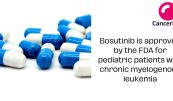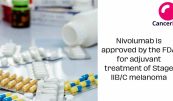Encorafenib with binimetinib is approved by the FDA for treatment of metastatic non-small cell lung cancer with a BRAF V600E mutation
The Food and Drug Administration (FDA) approved Encorafenib (Braftovi, Array BioPharma Inc., a wholly owned subsidiary of Pfizer) and binimetinib (Mektovi, Array BioPharma Inc.) in November 2023 as medicines that can be used to treat adults with metastatic non-small cell lung cancer (NSCLC) and a BRAF V600E mutation, which was found by an FDA-approved test.
The FDA also approved the FoundationOne CDx (tissue) and FoundationOne Liquid CDx (plasma) as companion diagnostics for encorafenib in conjunction with binimetinib. Testing of the tumour tissue is necessary if a plasma specimen does not reveal any mutations.
The open-label, multicenter, single-arm PHAROS (NCT03915951) study looked at 98 people with metastatic NSCLC and the BRAF V600E mutation. The study’s effectiveness was tested on these people. Prior use of inhibitors of BRAF or MEK was prohibited. Encorafenib and binimetinib were administered to patients until disease progression or unacceptable toxicity occurred.
An independent review committee evaluated the duration of response (DoR) and objective response rate (ORR), which were the main indicators of effectiveness. The ORR was 75% (95% CI: 62, 85) among 59 treatment-naïve patients, while the median DoR was not estimable (NE) at 95% (95% CI: 23.1, NE). The ORR was 46% (95% CI: 30, 63) among 39 patients who had been treated previously, and the median DoR was 16.7 months (95% CI: 7.4, NE).
Fatigue, nausea, diarrhoea, musculoskeletal pain, vomiting, abdominal pain, visual impairment, constipation, dyspnea, dermatitis, and cough were the most frequent adverse effects (25 percent or more).
For NSCLC mutated to BRAF V600E, the recommended oral doses of encorafenib 450 mg once daily and binimetinib 45 mg twice daily are administered.
View full prescribing information for Braftovi and Mektovi.
Dr. Nishant Mittal is a highly accomplished researcher with over 13 years of experience in the fields of cardiovascular biology and cancer research. His career is marked by significant contributions to stem cell biology, developmental biology, and innovative research techniques.
Research Highlights
Dr. Mittal's research has focused on several key areas:
1) Cardiovascular Development and Regeneration: He studied coronary vessel development and regeneration using zebrafish models1.
2) Cancer Biology: At Dartmouth College, he developed zebrafish models for studying tumor heterogeneity and clonal evolution in pancreatic cancer.
3) Developmental Biology: His doctoral work at Keio University involved identifying and characterizing medaka fish mutants with cardiovascular defects.
4) Stem Cell Research: He investigated the effects of folic acid on mouse embryonic stem cells and worked on cryopreservation techniques for hematopoietic stem cells.
Publications and Presentations
Dr. Mittal has authored several peer-reviewed publications in reputable journals such as Scientific Reports, Cardiovascular Research, and Disease Models & Mechanisms1. He has also presented his research at numerous international conferences, including the Stanford-Weill Cornell Cardiovascular Research Symposium and the Weinstein Cardiovascular Development Conference.
In summary, Dr. Nishant Mittal is a dedicated and accomplished researcher with a strong track record in cardiovascular and cancer biology, demonstrating expertise in various model systems and a commitment to advancing scientific knowledge through innovative research approaches.
- Comments Closed
- November 24th, 2023






biomarker-driven lung cancer drugs, BRAF V600E lung cancer treatment, encorafenib binimetinib NSCLC, FDA-approved BRAF inhibitors, MEK inhibitor combination therapy, oral treatments for NSCLC, resistance mechanisms in BRAF+ NSCLC, targeted therapy for metastatic NSCLC
CancerFax is the most trusted online platform dedicated to connecting individuals facing advanced-stage cancer with groundbreaking cell therapies.
Send your medical reports and get a free analysis.
🌟 Join us in the fight against cancer! 🌟
Привет,
CancerFax — это самая надежная онлайн-платформа, призванная предоставить людям, столкнувшимся с раком на поздних стадиях, доступ к революционным клеточным методам лечения.
Отправьте свои медицинские заключения и получите бесплатный анализ.
🌟 Присоединяйтесь к нам в борьбе с раком! 🌟